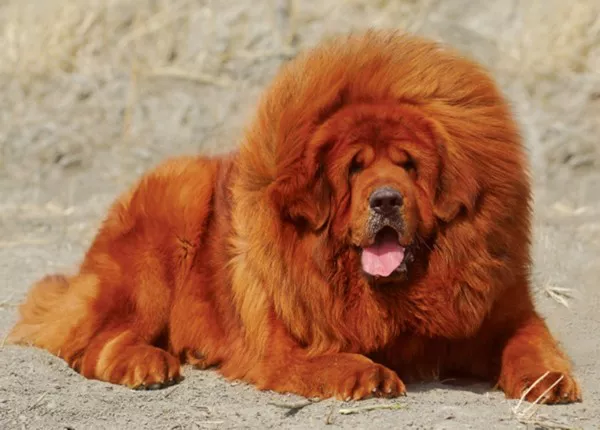The Red Tibetan Mastiff is one of the most fascinating and costly dog breeds in the world. Known for its majestic appearance, historical significance, and unique traits, this breed commands high prices in the market. This article explores the reasons behind the high cost of Red Tibetan Mastiffs, examining factors such as rarity, breed history, breeding practices, and market demand.
Historical and Cultural Significance
The high price of Red Tibetan Mastiffs can be partly attributed to their historical and cultural importance. Understanding this context provides insight into why these dogs are so valued.
Ancient Origins
Ancient Breed: Tibetan Mastiffs are one of the oldest dog breeds, with roots tracing back thousands of years to ancient Tibet. They were originally bred as guard dogs for livestock and properties, prized for their strength and protective nature.
Royal and Religious Symbolism: Historically, Tibetan Mastiffs were revered by Tibetan monks and nobility. They were considered symbols of power and protection, which adds to their allure and value.
Cultural Importance
Status Symbol: In Tibetan culture, owning a Mastiff was a mark of status and wealth. The breed’s association with royalty and nobility contributes to its high price today.
Legendary Status: Tibetan Mastiffs are featured in various legends and folklore, enhancing their mystique and appeal. This cultural significance plays a role in the breed’s high market value.
Rarity and Breeding Challenges
The rarity of Red Tibetan Mastiffs is a significant factor in their high cost. Several aspects contribute to their scarcity.
Genetic Rarity
Unique Coat Color: The red coloration of Tibetan Mastiffs is a rare and desirable trait. This unique coat color is less common than other colors like black and brown, making red Mastiffs more sought after.
Selective Breeding: Breeding Red Tibetan Mastiffs requires careful selection of parent dogs to maintain the rare coat color and desired traits. This selective breeding process is complex and costly.
Breeding Challenges
Health and Longevity: Maintaining the health of Red Tibetan Mastiffs is crucial. Breeders must address various health issues, such as hip dysplasia and genetic disorders, which can be expensive and time-consuming.
Limited Breeding Pools: The number of Red Tibetan Mastiffs available for breeding is limited. This limited gene pool makes it challenging to produce high-quality dogs, further driving up the price.
High Cost of Care and Maintenance
The cost of caring for and maintaining Red Tibetan Mastiffs contributes to their high market price. Several factors affect the overall expense of raising and caring for these dogs.
Grooming and Health Care
Grooming Needs: Red Tibetan Mastiffs require regular grooming to maintain their thick, dense coats. Professional grooming services and high-quality grooming products add to the overall cost.
Veterinary Care: Due to their size and specific breed-related health issues, veterinary care for Red Tibetan Mastiffs can be costly. Regular check-ups, vaccinations, and potential treatments contribute to the expense.
Nutrition and Exercise
Specialized Diet: Maintaining a proper diet for Red Tibetan Mastiffs involves high-quality, specialized dog food. Their nutritional needs must be carefully managed to ensure their health and longevity.
Exercise Requirements: These dogs require regular exercise to stay healthy and fit. The need for large spaces and regular physical activity can add to the overall cost of ownership.
Market Demand and Prestige
The market demand for Red Tibetan Mastiffs significantly influences their price. Several factors drive this demand.
Popularity and Exclusivity
Demand for Rare Traits: The unique red coat color and imposing stature of Red Tibetan Mastiffs create high demand. Buyers often seek out rare and exclusive dogs, contributing to their high price.
Status Symbol: Owning a Red Tibetan Mastiff is seen as a status symbol. The breed’s prestigious reputation and rarity make it highly desirable among wealthy individuals and collectors.
Breeder Reputation
High-Quality Breeding: Reputable breeders who produce high-quality Red Tibetan Mastiffs command higher prices. The investment in breeding practices, health testing, and maintaining high standards contributes to the overall cost.
International Market: Red Tibetan Mastiffs are sought after globally, with buyers willing to pay premium prices. This international demand further elevates their market value.
Economic Factors
Economic factors also play a role in the high price of Red Tibetan Mastiffs. Several aspects influence the overall cost.
Production Costs
Breeding Expenses: The cost of breeding Red Tibetan Mastiffs includes expenses for acquiring high-quality breeding dogs, health testing, and maintaining breeding facilities.
Raising Costs: The expenses associated with raising puppies, including food, healthcare, and socialization, contribute to the high price of Red Tibetan Mastiffs.
Market Fluctuations
Supply and Demand: The balance between supply and demand affects the price of Red Tibetan Mastiffs. Limited supply and high demand drive up the cost.
Economic Conditions: Economic conditions can impact the affordability of Red Tibetan Mastiffs. In times of economic prosperity, buyers may be more willing to pay premium prices, whereas economic downturns may affect demand.
See also: Can You Give a German Shepherd Ibuprofen?
Conclusion
The high price of Red Tibetan Mastiffs is the result of a combination of historical significance, rarity, breeding challenges, high maintenance costs, and market demand. Their unique appearance, cultural importance, and the complexity of breeding contribute to their status as one of the most expensive dog breeds in the world.
Understanding these factors provides insight into why Red Tibetan Mastiffs command such high prices. Their majestic appearance and the effort required to breed and maintain them make them a prized possession for those who seek a rare and exclusive companion. Whether driven by cultural significance, prestige, or simply the desire for a unique and impressive dog, the cost of Red Tibetan Mastiffs reflects their exceptional qualities and the dedication required to bring them into the world.
Related topics:
How to Brush a German Shepherd
How to Raise Pomeranian Puppies
Can a Golden Retriever Be Left Alone?


